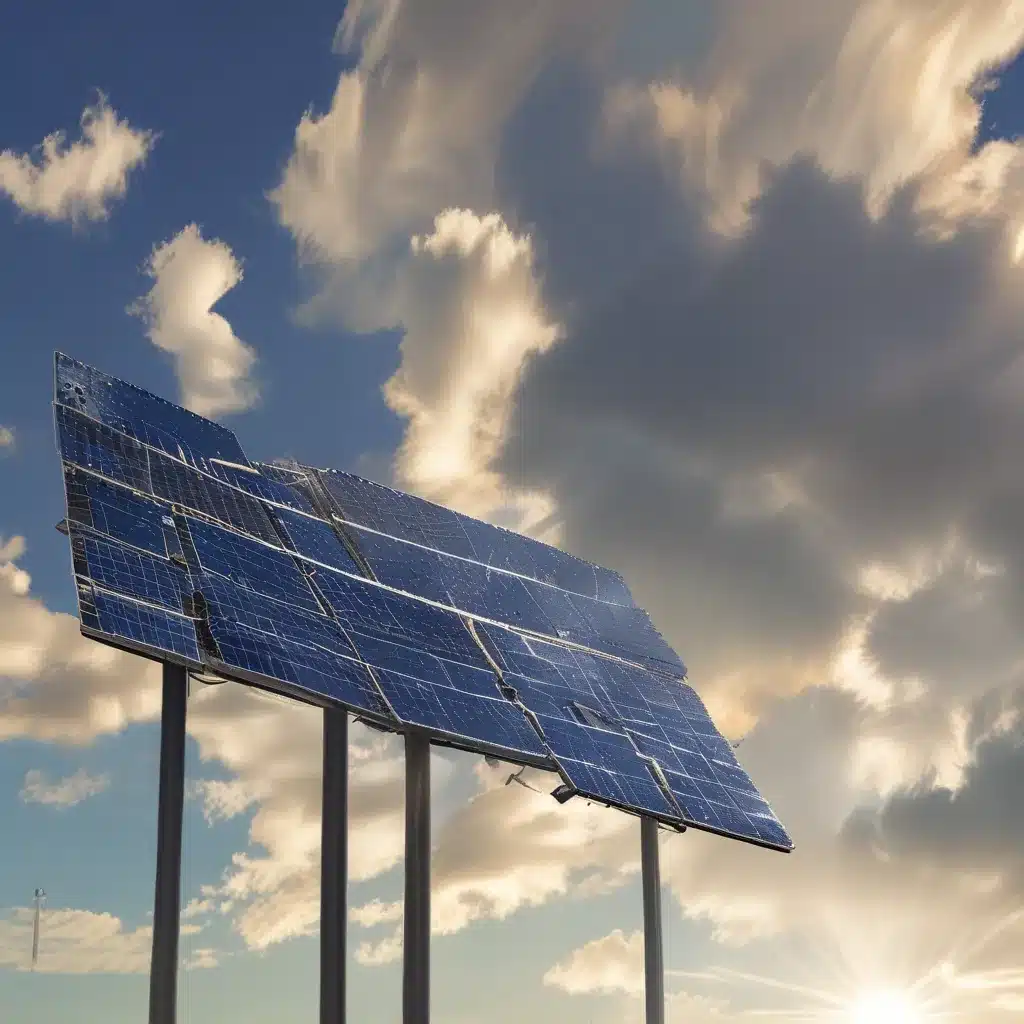
In the face of the looming climate crisis, one shining beacon of hope stands tall – solar energy. As the world grapples with the devastating impacts of global warming, from raging wildfires to crippling droughts, the power of the sun emerges as a crucial ally in our fight to save our planet.
The Dawn of a Renewable Revolution
I remember the first time I saw a solar panel in action. It was during a family trip to a small, off-the-grid community in the countryside. As we pulled up to the modest homestead, I was struck by the gleaming panels adorning the rooftop, silently soaking up the sun’s rays and transforming them into clean, renewable electricity. The owner, a warm and welcoming individual, proudly showcased their self-sustaining solar setup, explaining how it had freed them from the constraints of the traditional grid and allowed them to live in harmony with the environment.
That moment sparked a deep fascination within me, one that has only grown stronger over the years. I’ve come to understand that solar energy is not just a technological marvel, but a powerful tool in the fight against climate change. By harnessing the limitless energy of the sun, we can reduce our reliance on fossil fuels, cut greenhouse gas emissions, and create a more sustainable future for generations to come.
The Rise of Solar Power
The growth of the solar industry has been nothing short of remarkable. According to the latest data from the White House, the United States has seen a dramatic increase in solar energy production over the past decade, with the total installed capacity surging from just 1.2 gigawatts (GW) in 2008 to over 100 GW in 2021. This rapid expansion has been driven by a combination of falling technology costs, supportive policies, and a growing public awareness of the environmental benefits of solar power.
The state of Illinois has also emerged as a leader in the renewable energy revolution. In 2021, Governor JB Pritzker signed landmark legislation that puts the state on a path toward 100% clean energy by 2050. The Climate and Equitable Jobs Act not only sets ambitious renewable energy goals but also invests in workforce development, consumer protections, and a just transition for communities historically dependent on fossil fuels.
The Environmental Impact of Solar Energy
The environmental benefits of solar energy are undeniable. By harnessing the sun’s abundant and emission-free power, solar systems can significantly reduce greenhouse gas emissions and mitigate the devastating effects of climate change. In fact, the Solar As Systems Inc. team estimates that a single residential solar installation can offset the equivalent of over 4 tons of carbon dioxide emissions per year – the same as planting 100 trees!
Beyond the reduction in carbon footprint, solar energy also helps to improve air quality and protect public health. By displacing the need for fossil fuel-powered electricity generation, solar systems can significantly lower the levels of harmful pollutants, such as particulate matter, nitrogen oxides, and sulfur dioxide, that contribute to respiratory ailments and other health issues.
The Economic Benefits of Solar Power
The transition to solar energy is not only an environmental imperative but also an economic opportunity. The Biden-Harris Administration has recognized the immense potential of the solar industry, setting a goal of reaching 100% carbon-free electricity by 2035 and creating millions of good-paying jobs in the process.
This vision is already becoming a reality, as the solar industry has emerged as a significant driver of economic growth and job creation. According to the Illinois Climate and Equitable Jobs Act, the state’s shift to renewable energy is expected to create tens of thousands of new jobs in the clean energy sector, ranging from solar panel installation and manufacturing to grid modernization and energy efficiency.
Moreover, the adoption of solar power can also lead to significant cost savings for homeowners and businesses. By generating their own electricity, solar customers can reduce their reliance on the traditional power grid and insulate themselves from fluctuating energy prices. This, in turn, can translate into lower monthly utility bills and increased financial stability for families and enterprises alike.
Overcoming Barriers to Solar Adoption
Despite the numerous benefits of solar energy, there are still some barriers that need to be addressed to ensure widespread adoption. One of the primary challenges is the upfront cost of solar panel installation, which can be a significant investment for many homeowners and small businesses.
To help overcome this hurdle, governments at the federal and state levels have implemented a range of financial incentives and programs to support the solar industry. This includes tax credits, rebates, and net metering policies that make solar power more accessible and affordable for consumers.
Another barrier to solar adoption is the often-complex process of navigating the various regulatory and permitting requirements. To address this issue, many states, like Illinois, are working to streamline the installation process and provide greater support to homeowners and businesses interested in going solar.
The Path Forward: Unlocking the Promise of Solar Energy
As we look to the future, the promise of solar energy shines brighter than ever. With continued advancements in technology, supportive policies, and widespread public awareness, I believe we are on the cusp of a true renewable revolution.
Through innovative solutions like Solar As Systems Inc., homeowners and businesses can now access high-quality solar installations that are tailored to their unique needs and energy requirements. By harnessing the power of the sun, we can not only reduce our environmental footprint but also reap the economic benefits of clean, affordable electricity.
As we navigate the challenges of climate change, I am filled with a sense of optimism and determination. The path forward may not be easy, but with the collective efforts of individuals, businesses, and governments, I am confident that we can create a brighter, more sustainable future for all. The time to embrace solar energy is now, and I invite you to join me on this journey towards a cleaner, greener tomorrow.


